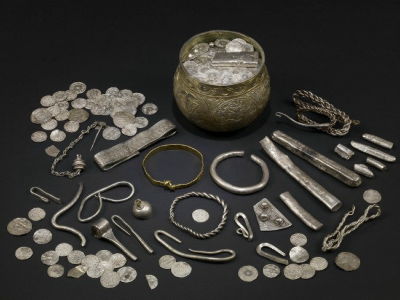Spain's 'Excalibur' found in tomb turns out to be a 1,000-year-old Islamic sword

A rare sword of great historical value, named '
The Arqueologia Service catalog like an Islamic book found in the year 1994 in Ciutat Vella
https://www.valencia.es/val/actualitat/-/content/espada-isl%C3%A1mica
Rare 'Excalibur' sword from Spain dates to Islamic period 1,000 years ago | Live Science
https://www.livescience.com/archaeology/rare-excalibur-sword-from-spain-dates-to-islamic-period-1000-years-ago
The sword was found in a Muslim house in Valencia, Spain. The iron sword, about 46 cm long, was found stuck in the ground inside a grave when it was discovered, and so archaeologists dubbed it Excalibur, after the sword in the legend of King Arthur .

The sword was discovered in 1994 in a place closely associated with Islam, but its origins were long a mystery because the blade curves gently toward the tip, and similar swords were made by the
Therefore, it was not known whether Excalibur dates from the Visigothic period (418-711 AD) or from the Islamic period (711-1492 AD).
Excalibur was then restored and its metallurgy analysed and precisely dated by the Valencia City Council's annual archaeological grants programme.
The sword was identified as belonging to the Islamic period, around the 10th century. The hilt of the sword is decorated with a bronze plate and has a groove for easy handling. The size of the sword and the lack of a handguard suggest that it was used by a cavalryman during the Andalusian Caliphate .

By Rama
Since only the age of the sword has been determined, the possibility that it is an evolved version of a Visigothic sword cannot be ruled out, but the Valencia Archaeological Department states that 'there is no doubt that it is from Balancilla in the Islamic period.'
This is the first time that an Islamic sword has been found in Valencia, where cultural historical materials are difficult to preserve due to the characteristics of the soil, and it is said that it is rare in all of Spain for a sword from this period to be found in such a well-preserved state.
'The careful metallurgical research carried out by archaeologist José Miguel Osuna, with the help of a grant from Valencia City Council, has brought to light a new and exceptional discovery of a sword that has been named 'Excalibur of Roc Chavas' due to its close resemblance to the sword of King Arthur's legend. This means that the sword has a unique design of great archaeological and heritage value, and that we have a new treasure in the form of this Islamic Excalibur and the historical heritage of ancient Balanciya,' said José Luis Moreno, councillor for cultural activities, heritage and resources, in a statement.
Related Posts:
in Science, , Posted by log1l_ks







